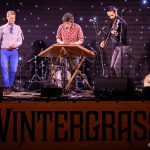Inside the Songs: Nathaniel Talbot’s Songs Take Root on the Farm
I first heard Washington State songwriter Nathaniel Talbot at a songwriter’s showcase in the Triple Door’s Musiquarium lounge. He was playing with Jeffrey Martin (who’s already done an Inside the Songs HERE) and Anna Tivel (who’s scheduled for an upcoming Inside the Songs). What a great trio of songwriters right here in our own backyard! Nathaniel’s songs were intimately rooted to the earth, tied to the cycles of nature, and somewhat mystifying. So when I approached him to do an Inside the Songs with Hearth Music, I wanted to hear about his connections to the natural environment. Turns out he’s an organic farmer on nearby Whidbey Island and works his love of the land into his songwriting. Here he talks about his new release, Here In The Fields.
Inside the Songs with Nathaniel Talbot
Tell me more about your work farming in the Pacific Northwest and how this informs your music!
Nathaniel Talbot: Two years ago I uprooted myself from the Portland music scene to pursue a career in organic farming on Whidbey Island. An interest in growing food had been creeping inside me for several years. I grew up on a 8-acre, mostly-forested homestead tucked in foothills of the Cascades, so perhaps the move north stemmed from a deeper desire, not just to farm, but more generally to rediscover a land-based way of life, as an adult, on my own terms. This was in no way a music-based decision. In fact, I had already began to accept that a move to a small, rural community and a commitment to a career in agriculture would likely result in an end to my musical career as I knew it. But it hasn’t worked out that way. If anything, farming has only cranked the heat under my musical kettle, so to speak, opening up vaults of new lyrical themes and imagery. The basic acts of hoeing, harvesting, and evening driving a tractor allow space for my mind to arrange and rearrange new musical ideas, play with lyrics, and if nobody’s around, sing aloud to myself.

“Jamestown”
Jamestown was inspired by a very basic ecological observation. Why do crows and ravens, while exhibiting such strong physical similarities and genetic relatedness, occupy such different niches both in the natural environment as well as human folklore? Crows are the weeds of the city, thriving and multiplying from refuse of human civilization, while ravens are generally relegated to the wilderness, or at least areas where the natural world has been partially spared. 
“The Great Levee”
I guess when spoken aloud, the phrase “soil erosion” doesn’t sound like the most poignant topic for a folk song. But I think that if we allow ourselves to dig beneath the rather emotionless or cursory first impression, I think there’s a lot there to explore. In fact, the loss of topsoil has arguably affected human civilization more than war, disease, or any other like phenomena, combined (whoa). As a new organic farmer I’m learning that careful soil management is paramount to long-term growing success, and as I become more attuned to it, I see of the consequences of soil neglect around me more and more. “The Great Levee” is an attempt to shine a bit of light on this arena, while at the same time illustrating some of the social dynamics that have helped accelerate our global loss of soil. The song takes of the form of a somewhat playful parable, occurring in no specific time or place. “Bucket by bucket-full we will carry…the clay back to it’s home on the hill.” This has actually happened, and continues to happen, in farming regions all over the world where the erosion has reached extremes. At the risk of sounding too academic (I know we’re supposed to be talking about music here…) I’d encourage folks to check out the book Dirt: The Erosion of Civilizations, which helped shape some of the ideas in this tune.
“Edison”
The Pacific Northwest empire was built by the logging industry, an industry that over the course of a mere century voraciously gobbled up over 90% of our native forests while simultaneously stripping itself of it’s own future. By the early ‘80s, when I was born, many small logging town like Edison, WA were already reeling from a decline in our forest lands, and then came the ‘90s when the Spotted Owl controversy and Northwest Forest Plan finally put a halt to what little clear-cutting opportunities remained (at least on certain federal lands). A lot of these towns never really recovered from this bust, and you can still see the impact as you drive through the economically depressed foothills of the cascades where I grew up. But Edison had a more interesting fate, seizing on an opportunity for tourism development, blended with a dose of art, slow food, DIY hipster culture and organic farming. When I first stumbled into this little town I was completely charmed and fascinated by its revitalization, which from talking to some locals, seemed to emerge out of a very intentional effort to create a way of living independent from any corporate industry. I hope their dreams last longer than those of their predecessors, as it will take something stronger that a house of cards to survive whatever economic storms the future inevitably holds.





